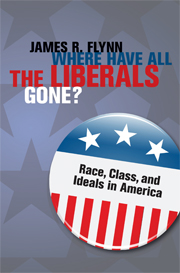Book contents
- Frontmatter
- Contents
- List of figures and maps
- List of tables
- List of boxes
- Acknowledgments
- Prologue
- Part I St. Thomas Jefferson
- Part II Blacks and the pursuit of happiness
- Part III Yours for a better world
- Part IV A history of moral confusion
- 8 William James and Leo Strauss
- 9 The status of the good life
- 10 Choosing to be free
- Epilogue
- Appendix: tables with comments
- References
- Index of names
- Index of subjects
10 - Choosing to be free
from Part IV - A history of moral confusion
Published online by Cambridge University Press: 22 September 2009
- Frontmatter
- Contents
- List of figures and maps
- List of tables
- List of boxes
- Acknowledgments
- Prologue
- Part I St. Thomas Jefferson
- Part II Blacks and the pursuit of happiness
- Part III Yours for a better world
- Part IV A history of moral confusion
- 8 William James and Leo Strauss
- 9 The status of the good life
- 10 Choosing to be free
- Epilogue
- Appendix: tables with comments
- References
- Index of names
- Index of subjects
Summary
It matters not how straight the gate
How charged with punishment the scroll,
I am the master of my fate,
I am the captain of my soul
(William Ernest Henley, Invictus, 1875)In a surprisingly strict and technical sense the American radical tradition has been based on a philosophy of free will.
(Straughton Lynd, 1969, pp. 168–169)Besides the motives felt, and besides the formed habits or past self, is there not a present self that has a part to perform in reference to them both? Is there not a causal self, over and above the caused self (the character) that has been left as a deposit from previous behaviour?
(Michael Maher, SJ, 1940, p. 410)I have always had to struggle to live up to my ideals, and on occasion they have cost me some sacrifice of safety and liberty. I would like to have a license to believe that the important decisions were free choices for which I deserve either moral praise or moral blame. If you are someone for whom that is a matter of indifference, you can skip this chapter. If not, you will find herein a case that free will is an open option.
I fear that this means arguing for no less than ten propositions:
We presume free will when deciding what to do.
The concept of free will is coherent.
We must ask whether or not that presumption corresponds to reality.[…]
- Type
- Chapter
- Information
- Where Have All the Liberals Gone?Race, Class, and Ideals in America, pp. 264 - 295Publisher: Cambridge University PressPrint publication year: 2008



